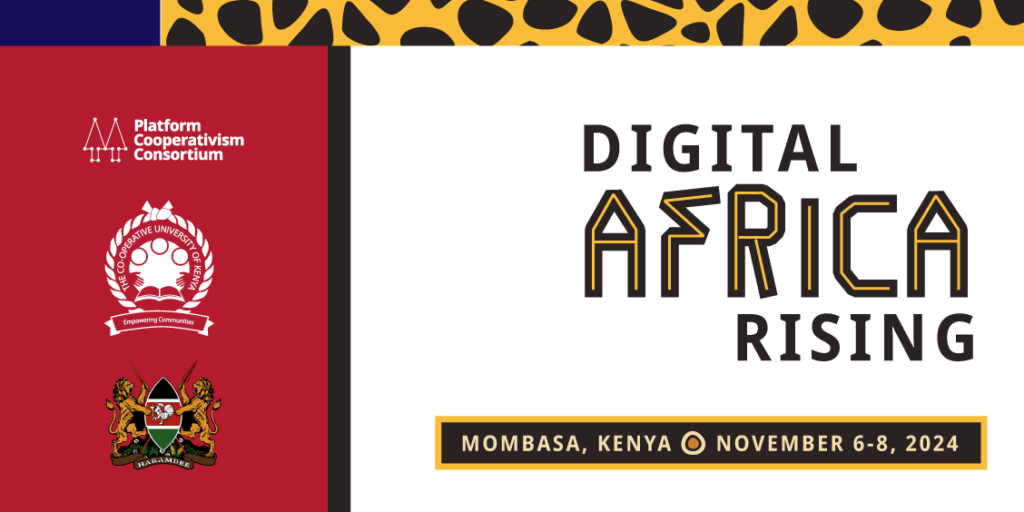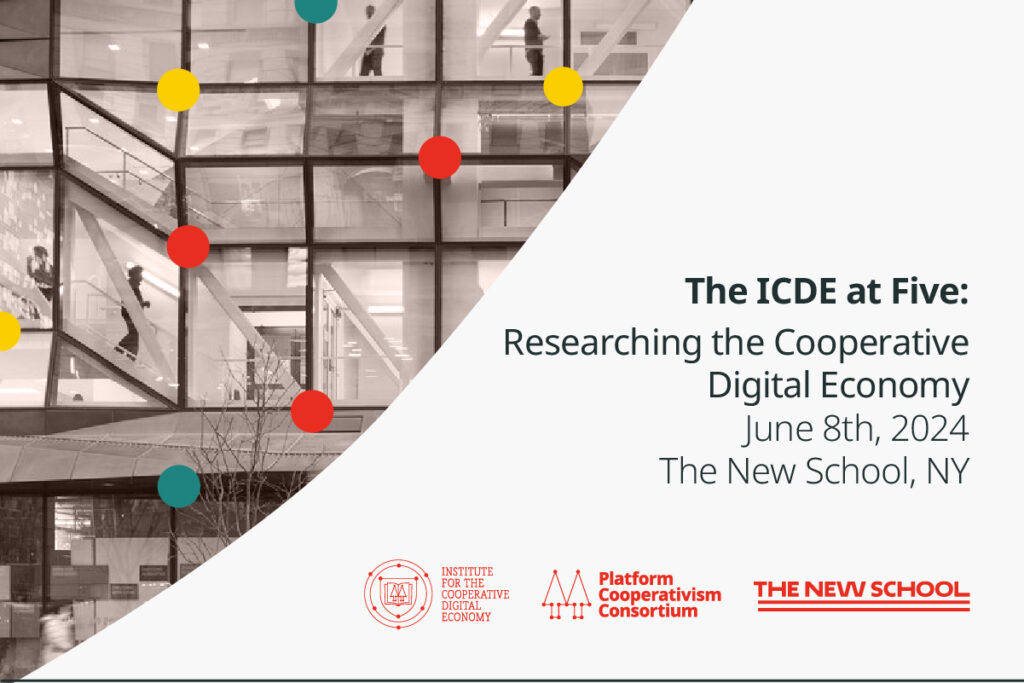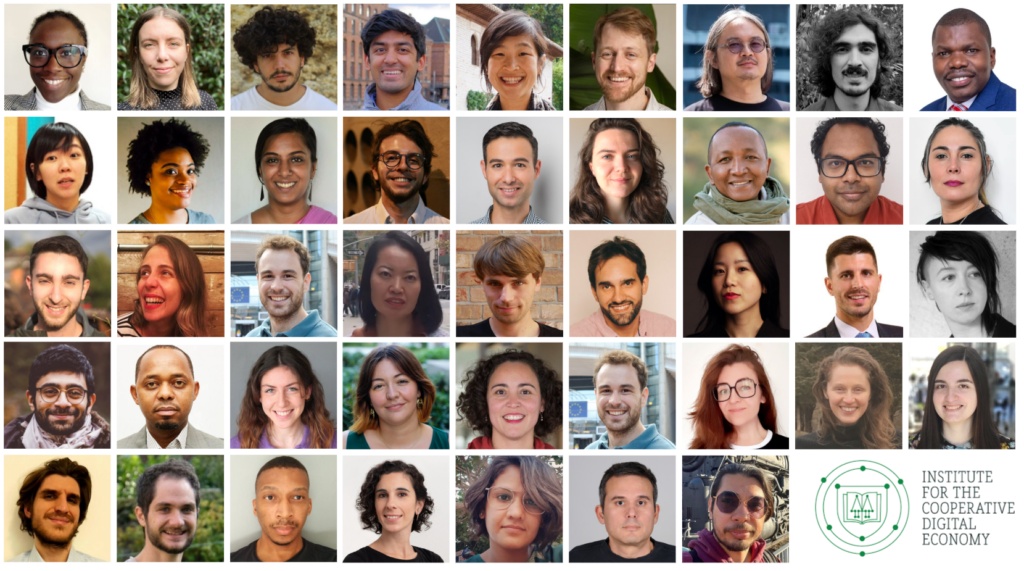A Silver Buckshot, Not A Silver Bullet

Exploring the digital cooperative economy in 2024, achievements collide with hard-earned lessons. This newsletter explores these dynamics, highlighting the challenges and successes of platforms like Ampled, Driver’s Seat, and Fairbnb. Although there isn’t a “Wikipedia of platform co-ops” that outcompeted a tech incumbent, the digital cooperative economy is steadily growing, evidenced by new projects and policy wins benefiting millions globally. Notably, we’ve tracked 638 projects, including:
- Transkribus (UK): secured $10 million in funding,
- Señoritas Courier (Brazil): launched a digital platform emphasizing fair algorithms and worker input,
- SmartTeller (Nigeria): drives financial inclusion, and
- Artisans Cooperative (US): emerged post-Etsy strike.
Novlr(UK), though not new, continues to thrive as a writer-owned platform. Carefully (US) is redefining childcare. Ride United (US), a platform co-op launched by a union, promotes economic democracy for taxi workers. Meanwhile, Drivers Cooperative (US) expands to Minnesota and Colorado.
While these advancements are promising, we are also venturing into relatively uncharted territories. Have you already explored DAOs like IndieDAO that incorporate cooperative principles? Andrea Peña Calvin is specifically investigating DAOs that genuinely adhere to these principles, exploring new avenues and challenges in cooperative governance. Meanwhile, on our blog, check out Eli Zeger’s new article ‘Owner’s Remorse‘ critiquing the Web3 space, arguing that while some proponents celebrate blockchain technologies as democratizing tools, they often replicate traditional capitalist structures. In these cases, the rhetoric of economic justice masks an underlying shareholder capitalism with power concentrated among VCs and large token holders.
Amidst these critiques, we are encouraged by the increasing recognition of platform cooperatives. Recent OECD papers have highlighted their significant potential. Moreover, a major legal change in the UAE now allows over 8.7 million non-citizens to participate in economic activities through cooperatives, opening new opportunities explicitly for platform co-ops. This new law marks a significant shift from previous restrictions, opening up opportunities for the establishment of new platform co-ops.
Confronting Challenges, Crafting Solutions
Despite these positive developments, platform cooperatives face tough challenges. A recent talk with Austin Robey provided spicy reflections during a post-mortem of Ampled. Robey’s critiques emphasized that platform cooperatives must focus on creating valuable products and services for users, avoid relying on virtue signaling, and address the operational and financial challenges to improve their public perception and sustainability.
These issues are not new; the tension between “winning and being cute,” as well as other laments brought up by Robey, has long been an issue. Eve O’Connor’s essay traces this historical relationship between cooperatives and technology, from 19th-century England to modern platform cooperatives, highlighting the ongoing struggle to preserve autonomy and communal values in the face of capitalist pressures. While some founders believe imitating capitalist practices with a worker self-management twist can achieve Silicon Valley-level financial windfalls, others focus on addressing gaps where large corporations fall short.
For instance, Som Mobilitat has successfully expanded their e-car rental cooperative into suburban and rural Catalonia in partnership with the Mobility Factory federation, showing the potential for cooperatives to flourish in markets where larger firms are less interested because the profit margins are less lucrative. Emphasizing business viability, integrating collectives into solidarity movements, and forging connections with unions and social movements are crucial for success. It’s critical to understand that cooperatives scale differently than venture capital-funded businesses.
Facing serious hurdles, to amplify resilience and win, we must embrace an organizational bricolage—a silver buckshot rather than a silver bullet—replacing internal conflicts with solidarity and confidently leveraging diverse strategies that collectively create economic systems in the digital economy and beyond that are equitable, just, and proactively inclusive. I discuss this vision of a digital cooperative commonwealth in detail in my new book, Own This!: How Platform Cooperatives Help Workers Build a Democratic Internet.

To address these issues, we’re convening an event titled ‘Exploring Business Models for Collective Flourishing with Cooperative Principles‘ on June 13th. Register today! Speakers from the International Cooperative Alliance, NYU Law School, and a former ILO leader will cover topics like legal structures for LLC worker cooperatives, Limited Cooperative Associations, and DAOs.
To address challenges like sustainable income and including vulnerable groups, we must examine cooperative models in the digital economy. Worker and multi-stakeholder co-ops face obstacles such as funding and restrictive laws. The ICDE research report by Akkanut Wantanasombut examined the Tamsang-Tamsong platform cooperative, comparing a worker-owned cooperative in Surat Thani with a multi-stakeholder cooperative in Phuket, aligning with our goals of equitable labor practices and inclusive economic growth.
Legal Reforms & the Public Option
Founders should consider federating and leveraging existing digital infrastructure. Embracing flexible legal structures adhering to cooperative principles, even without formal incorporation, is beneficial. Our research highlights public-cooperative partnerships in Thiruvananthapuram, San Diego, Araraquara, Bologna, and New York City. These collaborations create resilient environments by leveraging municipal support. The 2023/2024 ICDE reports revisit these models, exploring new platform cooperatives, as emphasized in Udayan Tandon’s essay ‘Driving Economic Justice: Cooperative Taxis,’ a collaboration between a cooperative, a union, and the city.
Legal reforms are essential for the growth of international cooperatives, as discussed by ICA’s Director of Legislation, Santosh Kumar Padmanabhan, in ‘Legalize Global Co-Ops.‘ He argues for supportive legal frameworks worldwide. For example, while platforms like Stocksy United operate globally in over 80 countries, restrictive laws in many areas, particularly the ‘Global South,’ can hinder local artists from participating. This limitation highlights the critical need for legislative changes to facilitate the formation and participation in globally distributed platform cooperatives also in ‘Global South’ countries.

Upcoming PCC Conference in Mombasa Exploring Pan-African Initiatives
Complementing this, Lola Brittain’s ‘Platform Cooperatives x Fairwork‘ examines how Fairwork’s standards align with cooperative principles and calls for a reevaluation before the ‘Digital Africa Rising‘ conference in Mombasa from November 6-8, 2024. This event will explore the challenges of scaling larger cooperatives, emphasizing the need to maintain democratic norms alongside financial goals. Set in a country where cooperatives contribute significantly to the GDP and where 75% of the population is under age 35, the conference will highlight technological innovations in agriculture, finance, transportation, and healthcare. The conference is jointly convened by the Platform Cooperative Consortium, Cooperative University of Kenya, and the Government of Kenya, in partnership with Fair Work and Cooperation Africa.
At the conference, we will explore digital initiatives like South Africa’s Fish with a Story and iNethi, as well as a Tanzanian cooperative that digitizes lending for Maasai women. We will also highlight Adotey Hoffman’s insights on the fight of Ghana’s delivery couriers, demonstrating our support for transformative projects across Africa. Additionally, we’ll discuss the potential of a cooperative ‘Uber for tractors’ in Ghana, as analyzed by Katarzyna Cieslik, contrasting these solutions with traditional tractor hire arrangements through farmer-based cooperative organizations.
Case Studies
Building on these examples, Anne-Pauline de Cler will present her research ‘Food Commons: Nurture vs. Capture,’ at the Mombasa conference. Her comparative analysis of the Open Food Network in the U.S. and France explores how these networks serve as communal resources and resist capitalist dynamics. This presentation will enhance our discussions on agricultural and food distribution strategies. Such emphasis on case studies, continues to be a cornerstone of our strategy, as carried forward by the 2024-2025 cohort of fellows.
In recent months, we have concluded our work with our 2023/2024 research fellows, who participated in our Roots of Resilience conference in India last year. We have also welcomed the new cohort, which has introduced their research program for the upcoming year through a series of research briefs. We have also mapped out a special journal issue, forthcoming in 2025, introduced our new 22 Affiliate Faculty, and published numerous new thought pieces.
Looking ahead, ‘Platform Cooperativism and the Political Philosophy of Workplace Technologies‘ by Tim Christiaens explores the power dynamics of algorithmic management and advocates for worker-owned labor platforms. This piece is an essential addition to our discussions on how cooperatives can reshape the workplace.


New Research and Celebrating 5 Years ICDE : NYC Symposium
The “ICDE at 5” symposium, set to be held in-person at The New School in NYC on June 8th, invites all 43 current and former ICDE research fellows. This group includes Ph.D. students, artists, and cooperators who are actively involved in research that integrates cooperative principles within the digital economy. If you’re in New York City and serious about academic research and cooperatives undergoing the digital transformation, don’t miss this anniversary event, which offers a singular opportunity to engage with emerging scholars in the field. Register!
We’re excited to announce mini-courses developed with the National Cooperative Business Association (NCBA CLUSA) to support small cooperative farmers in the American South, helping them address environmental and socio-economic challenges considering AI technologies. These courses connect seamlessly with the broader theme of sustainable agriculture, spotlighted in Harinjaka A. Ratozamanana’s ‘Regenerative Co-op Farming in Madagascar,’ which emphasizes the pivotal role of regenerative farming cooperatives in enhancing agricultural practices.
As we reflect on the profound challenges highlighted at the beginning of this newsletter, we also recommend following our friends at RMEOC Social Cooperative Academy’s event series on social cooperatives.
We value your ongoing involvement in our shared learning journey. Feel free to reach out, and keep an eye out for upcoming updates, including our plans for the 2025 UN International Year of Cooperatives.
~ Trebor Scholz